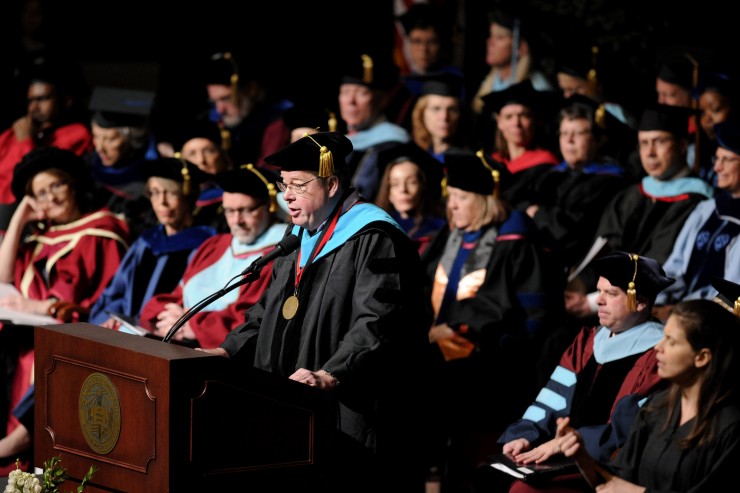 If you knew the impact your decisions could have 50 years from now, would you make the same choices?
If you knew the impact your decisions could have 50 years from now, would you make the same choices?
It’s a question Hunter Hustus began exploring while pursuing his Doctor of Law and Policy at Northeastern—one the technical advisor of strategic deterrence and nuclear integration for the U.S. Air Force knew could help him craft more effective public policy.
“When you make decisions about policy, you’re making decisions for 50 or 60 years,” Hustus says. “But if you give people a tool to use, they can learn something about their own assumptions and say, ‘Wow, this doesn’t work the way I expected it to.’”
Officers lack an appropriate method to test their theories about nuclear weapon strategy and deployment. Hustus brought that challenge from his work at the Pentagon to his doctoral thesis, developing a web-based game to provide a safe space for nuclear weapons officers to evaluate their assumptions across different scenarios. His hypothesis was that the more knowledge officers had upfront, the more flexible of policy decisions they’d later develop.
Casper Harteveld, an assistant professor of game design at Northeastern’s College of Arts, Media and Design, served as Hustus’s doctoral advisor. Harteveld helped Hustus develop the digital gaming component of his project that he used to collect his research data, as well as write a journal article the two plan to submit within the next few months.
“I still collaborate with my advisor, so that’s been a very rewarding relationship even after school,” says Hustus, whose thesis won him the 2016 Dean’s Medal for Outstanding Doctoral Work.
His research has been recognized by more than just Northeastern, however. Since completing the program, one of Hustus’s colleagues has decided to perform a deeper quantitative analysis of the data Hustus wasn’t able to study during his project. Within the next two years, Hustus also sees his work being incorporated into a larger, gaming-based research project.
“I’ve spoken to a number of people about considering these research techniques for other applications,” Hustus explains. “There aren’t a lot of places to get experience in the situations we worry about [at the Pentagon]. Gaming affords us the way to do that.”
Having the ability to apply what he’s learned directly to his workplace and earn his doctorate has helped Hustus advance professionally. He notes the time he spent interviewing government, think tank, and university experts for his thesis makes his current interactions with stakeholders from each group more meaningful, because he can apply what he’s learned to those relationships.
“Completing the degree changed my internal work relationships a little bit, too,” Hustus adds. “It’s clear my organization likes having another person with a doctorate on staff. They permit and expect me to represent in the Pentagon alongside a team of folks looking at what the discourse environment is in our security issues.”

Hustus at his doctoral hooding ceremony. | Image via Matthew Modoono
Hustus and his team are responsible for determining what the next administration needs to make policy decisions. He describes his job as one that largely involves “talking to other people to get them to understand what his team is doing—in their own words and in their own way.”
Communicating across cultures, with professionals from various backgrounds, was an integral part of the Doctor of Law and Policy program, which features a cohort model, in which incoming students progress through identical coursework at the same pace. Hustus’s classmates came from a range of industries, such as higher education administration, healthcare, social welfare, nonprofits, and defense.
“We were all really different people,” Hustus says, “but the diversity of the group really helped me see issues from different perspectives. Seeing how people could see the same thing very differently also increased my tolerance for ambiguity.”
Guest speakers, such as Harvard Law School Professor Randall Kennedy or former Massachusetts Governor Michael Dukakis, helped inform the students’ perspectives, and the program’s professors pushed the students to dig deeper.
“The professors helped me think deeper through the issues, beyond just perspective to the implications,” Hustus explains. “I learned horizontally from my peers and vertically from my instructors and guest speakers.”
Hustus notes he’s still in close contact with several of his classmates, often sending them job announcements or even helping write grant proposals for research. The ability to take what he’s learned from his peers and the program and apply it to his job is what he’s found to be most beneficial.
“The fact that the Doctor of Law and Policy was an ‘applied’ degree was a big plus for me,” Hustus says. “To be focused on implementing public policy change versus theorizing about it was powerful. The application approach means I can make a difference in development and execution of public policy in a practical manner.”
This post is the first in a series highlighting the power of the Northeastern network. For Hunter Hustus, his network helped him see the world from a different perspective, accomplish his goals at work, inform more flexible public policy, and advance in his career.
Are you ready to take the next step? Learn more about how the Professional Advancement Network can help you achieve your personal and professional goals—anytime, anywhere.





Related Articles
Why Earn a Professional Doctoral Degree?
5 Tips to Get the Most out of Grad School
Is Earning a Graduate Certificate Worth It?